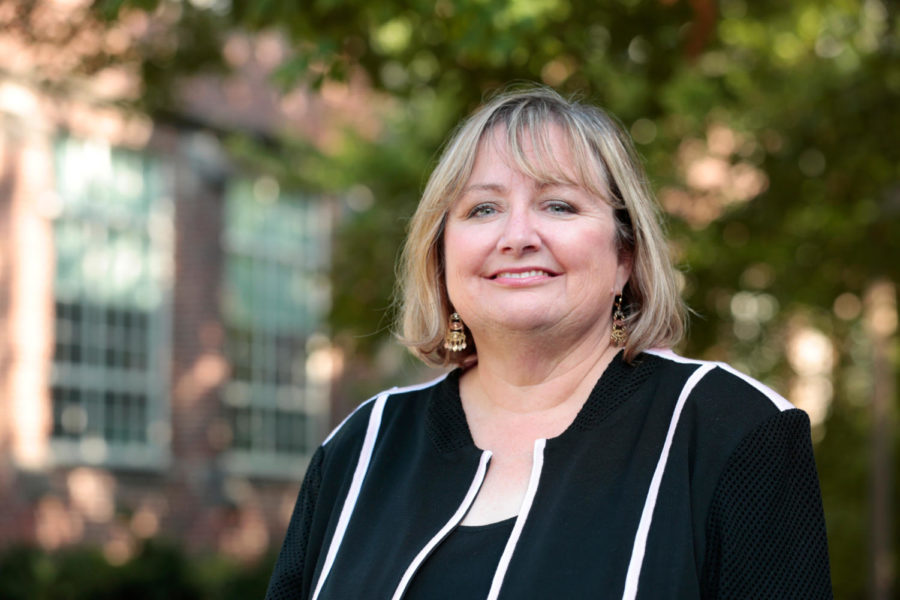Ombuds Office offers neutral space for graduate student, faculty and staff issues
Courtesy of Christopher Gannon/Iowa State University
Deanna Clingan-Fischer is the new Ombuds Officer at Iowa State University.
September 18, 2017
Tucked away on the first floor of Physics Hall, a small office with a funny name is working to help resolve conflicts and create a better environment for staff and graduate students.
The Ombuds Office, located at 37 Physics Hall, provides tools and resources to help faculty, Professional & Scientific empoyees (P&S) and graduate students have crucial conversations and empower them to resolve conflicts themselves.
The office acts as a mediator. An impartial, neutral ground where students, faculty and P&S employees can come confidentially air their grievances and, if desired, take steps to make a change. They provide conversation coaching, policy advice and can act as mediator between parties.
The office is not an advocate, nor will they formally investigate complaints or provide legal services. Rather, it is a place where students and faculty can resolve conflict, whether it be with a peer or with a supervisor. It also doesn’t serve undergraduate students and instead redirects them to the university’s human resources.
The Ombuds Office was founded as a pilot program in 2006 by two retired staff members. The program was so successful that the university decided to make it a priority, granting it part-time status soon after.
This year marks a milestone for Ombuds, however, as the office is moving from part-time to full-time due at least in part to demand. Leading the transition is Deanna Clingan-Fisher, the university’s new Ombuds officer.
Clingan-Fisher, a Drake alum with a bachelor’s degree in economics and a law degree, has spent the last 27 years working as an advocate for the elderly, first as legal services developer in the Department on Aging, then as an Ombuds officer for the Office of the State Long-Term Care Ombudsman.
In that role, she was an advocate for the elderly, working to help empower aging members of society to make decisions and education family members about proper care.
Although the demographic and the role itself is a bit different, for Clingan-Fischer, the desire to help others remains the same.
“It’s always been my passion,” Clingan-Fischer said. “I just see so many barriers that are placed in front of people who don’t know how to respond and they need someone just gently moving them toward the right resolution for them.”
While Clingan-Fischer is still settling into her new position — she’s only been at Iowa State a little over a month — she is already developing a plan to increase outreach and help spread awareness of the office on campus.
“Looking at the big picture and trying to focus on ‘what are the systemic issues’ remains the same,” Clingan-Fischer said.” Just because I can’t take a side doesn’t mean I can’t still hear and look and observe things that are part of a culture and work on changing that on behalf of everyone, even if they don’t realize they’ve had an issue.”
To help guide a plan of action, Clingan-Fischer plans to use the Ombuds Office Annual Report, which the office has released every year since 2009.
Last year’s report showed one of this busiest years for the office, with 128 individuals contacting the office for service. The key issues were interpersonal conflict, perceived lack of respect, concerns and questions about policies and matters related to work-life balance.
“Globally, I would say that the majority of the concerns and complaints that are coming my way do relate to conflict or dialogue within a relationship,” Clingan-Fischer said. “Whether it’s co-worker to co-worker, or it’s worker to supervisor or graduate to adviser.”
According to the report, 50 percent of the 40 faculty members and 57 percent of the 28 P&S staff members who approached the office cited a conflict with a supervisor. 35 percent of faculty and P&S cited a lack of respect.
That number, according to the report, isn’t too surprising, as a lack of respect has been a fairly common complaint since the office first opened.
As for its somewhat strange location in Physics Hall, Clingan-Fischer says it’s all part of the office’s commitment to confidentiality.
“They placed the Ombuds office is a site off of Beardshear for the reason that people could then come in and out and not worry about being seen as going in to talk to the Ombuds office,” she said. “It’s lowkey.”
















